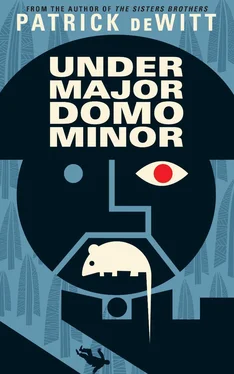“Do you have a time in mind when you might?”
“Quite soon, I hope.”
“You were always a fair man.”
“I like to believe it, sir.”
The Baron grimaced. “Why does my head hurt?”
“Well, sir,” said Mr Olderglough, “you were in such a state that I was forced to club you.”
“ Club me, did you say?”
“Indeed.”
“I didn’t know you had it in you.”
“Nor did I. Actually, and if I may be so bold, it was somewhat thrilling.”
“Surely it must have been. You’ll have to tell me about it one day.”
“Yes, sir.”
“Has anyone else been injured?”
“You clipped my wing some time back, but I’m one hundred percent at present. And you gave young Lucy here a fright that resulted in a knock on the skull, isn’t that right, boy?”
The Baron looked across at Lucy, and a sorrowful mien came over him, as though regarding Lucy’s porcelain countenance in the honest light of day brought his sins back to him, so that a shame took hold of him, and he turned away to bury his face in his pillows and bedding. He was for a time consumed by his sadness, his tone a high, whining wheeze; and Lucy studied the Baron as a pitiable but highly sympathetic individual. But Lucy’s empathy was short-lived, as a brief while later the Baron’s voice took on a gruff edge, and now did his rage come edging back, and he began once more to rant and spit and curse, his alter ego having reclaimed stewardship of his spirit. Lucy found this disheartening, not to say frightening; but Mr Olderglough was not the least surprised. He led Lucy from the Baron’s chambers. In the hall he regarded him kindly. It was to be, he assured his protégé, an undertaking.
Some days and nights passed. Lucy and Mr Olderglough sat with the Baron, together and separately, feeding him and speaking with him and leading him away from his manias the way a child might be led away from a carnival. One morning Lucy entered the Baron’s chambers and found the man was no longer manacled, but sitting upright in his bathtub, and his hair had been cut, his scraggly beard shaven, revealing a handsomely angular face. He was reading the letter the Baroness had written with a look of horror.
“Are you not pleased that she’s returning, sir?” Lucy asked.
The Baron folded the letter and set it upon the side table. “All I know, boy, is that life is, on occasion, entirely too vast for my tastes.” Here he submerged himself, and afterwards did a great many bubbles rise up from the depths of the bathtub, this due to the fact of the Baron screaming underwater.
There was a period of frantic activity at the castle. While Lucy and Mr Olderglough had been tending to the Baron, Agnes had travelled to Listen and back; and in the coming days there followed in her wake deliveries of grain, flour, spices, candles, fowl, fish, kegs of ale, crates of wine and brandy, and all manner of culinary rarities Lucy had not heard of, much less tasted. The tailor arrived, three assistants in tow, and these four worked in earnest to prepare a new suit of clothes for the Baron, and another for Mr Olderglough, whose outfit had devolved to something beyond shabby. The offending garment was afterwards burned, and now Mr Olderglough moved sleekly through the halls in an ink-black morning coat, the portrait of surefooted elegance. He went about his work with a surplus of energy Lucy had not witnessed in the man; and Agnes, too, was all the more vital in her exercises. It was as though, with the re-awakening of the Baron’s senses, so did the health of his longtime subordinates likewise resume focus. Only now did Lucy understand what fond memories Mr Olderglough and Agnes had been clinging to; only now did he appreciate the satisfaction they received in doing their work. And it was no small surprise that he found himself feeling similarly, but so it came to pass: the castle was sunlit, and all about there was the sense of hopefulness for the future.
Which is not to say Lucy had an easy time of it. Three days before the Baroness was to arrive, Mr Olderglough ushered him into the ballroom and said, “I would like you to please tidy up the area, now.”
“Which area, sir?”
“The location as a whole.”
“Meaning this room, sir?”
“All right, yes.”
Lucy considered the size of the space. “When you say tidy, sir.”
“Wash the windows. Wash the floors. Wash the walls. Wash the ceilings.”
“Wash the ceilings,” said Lucy.
“Air the room. Clean out the grates. Uncover the furniture. Polish the trim and accoutrements. Once you’re through here, then move on to the next room, and the next, and so on.”
Lucy said, “It sounds, sir, that you’re asking me to clean the castle from bottom to top before the Baroness returns home. Is that correct?”
“Is there a problem with that, boy?”
“In that it’s not possible to achieve I would say that there is, yes.”
Mr Olderglough thought this an unfortunate attitude, and furthermore voiced a concern that Lucy was becoming too familiar for one in his position. But in the end he gave way, and Lucy was allotted a small allowance with which to hire help from the village. He enjoined a half-dozen of the meanest-looking women about, the same group who had teased him in regard to Klara’s cape, the idea being that they possessed the necessary fortitude to attack such an outsize endeavour. The scheme bore fruit in that the group cleaned with palpable anger, as though the accrual of dirt were an affront to their honour. This hostility was a boon for the task, but proved less advantageous in other ways. Lucy was afraid of the women, and they knew this, and exploited it by pinching and prodding and harassing him; they made crude jokes at his expense for the pleasure of seeing him blush; the stoutest of the bunch at one point pinned Lucy’s head to the wall with her behemoth breast, so that he flailed his arms and was panicked to catch a breath.
Indignities aside, Lucy’s plan was a success: the work was completed without flaw, and the castle was returned to a state befitting a Baroness. The feeling among the staff was an invigorating concoction of jubilation and dire agitation, both of these held in check, at least so much as was possible.
In the centre of this bustle was the Baron, and it was days before Lucy could take his eyes off the man, this due not only to the fact of his remarkable return to civility, but because the person who had emerged from those ghastly shadows was the most alluring sort of gentleman imaginable. To watch him simply enter a room was in itself an entertainment; he was a danseur noble crossing a stage, his every movement so unhesitatingly graceful as he reached in one fluid motion for a book, an ashtray, a pitcher of water — effortless performances which led Lucy to wonder at the standards or qualities of noble blood, and whether or not one in his own modest position might will his blood to clarify, to improve itself. He thought not, ruefully.
Beyond the physical, there was ever more to admire in terms of the Baron’s temperament and personality. In the days preceding the Baroness’s arrival, he oversaw each aspect of the castle’s rehabilitation with a firm hand and meticulous eye; and yet he was never anything other than gracious to his underlings, instilling in the same sequence both sympathy and command — here were the attributes, Lucy realized, of the true leader. He was particularly admiring of how the Baron addressed Agnes’s scullery shortcomings. Sampling her stew, for example, he might act as though he were partaking of a delicacy, his abhorrence completely hidden away, afterwards lavishing her in praise, which she drank up like sunlight. Thus mollified, the Baron would then say something like, “I do wonder if the pepper isn’t dominating the dish, however, when your beautiful roux is clearly the leading light of the show?”
Читать дальше












